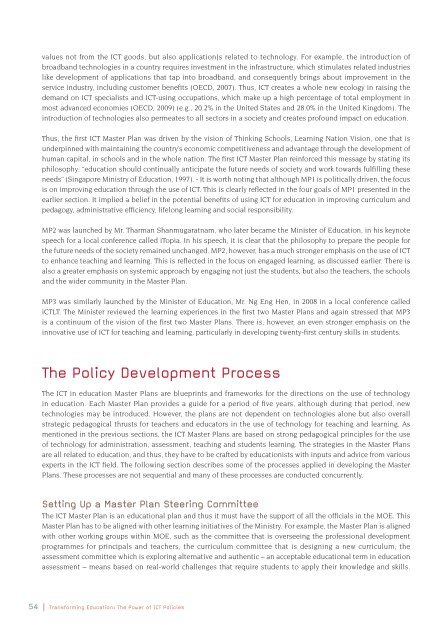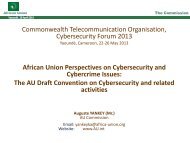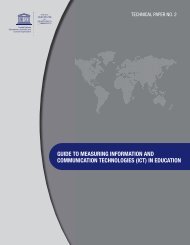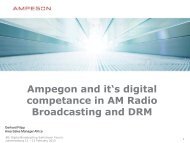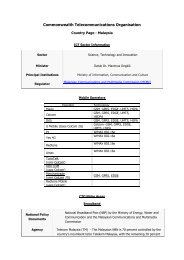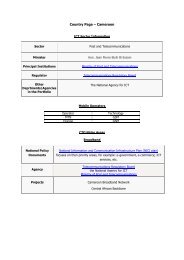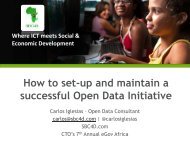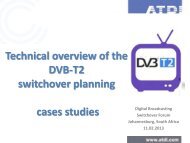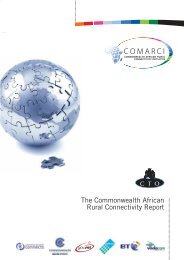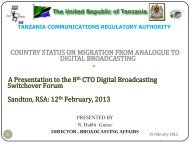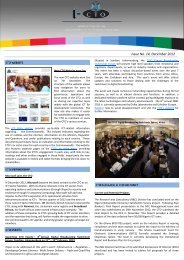Transforming education: the power of ICT policies - Commonwealth ...
Transforming education: the power of ICT policies - Commonwealth ...
Transforming education: the power of ICT policies - Commonwealth ...
Create successful ePaper yourself
Turn your PDF publications into a flip-book with our unique Google optimized e-Paper software.
values not from <strong>the</strong> <strong>ICT</strong> goods, but also application[s related to technology. For example, <strong>the</strong> introduction <strong>of</strong><br />
broadband technologies in a country requires investment in <strong>the</strong> infrastructure, which stimulates related industries<br />
like development <strong>of</strong> applications that tap into broadband, and consequently brings about improvement in <strong>the</strong><br />
service industry, including customer benefi ts (OECD, 2007). Thus, <strong>ICT</strong> creates a whole new ecology in raising <strong>the</strong><br />
demand on <strong>ICT</strong> specialists and <strong>ICT</strong>-using occupations, which make up a high percentage <strong>of</strong> total employment in<br />
most advanced economies (OECD, 2009) (e.g., 20.2% in <strong>the</strong> United States and 28.0% in <strong>the</strong> United Kingdom). The<br />
introduction <strong>of</strong> technologies also permeates to all sectors in a society and creates pr<strong>of</strong>ound impact on <strong>education</strong>.<br />
Thus, <strong>the</strong> fi rst <strong>ICT</strong> Master Plan was driven by <strong>the</strong> vision <strong>of</strong> Thinking Schools, Learning Nation Vision, one that is<br />
underpinned with maintaining <strong>the</strong> country’s economic competitiveness and advantage through <strong>the</strong> development <strong>of</strong><br />
human capital, in schools and in <strong>the</strong> whole nation. The fi rst <strong>ICT</strong> Master Plan reinforced this message by stating its<br />
philosophy: “<strong>education</strong> should continually anticipate <strong>the</strong> future needs <strong>of</strong> society and work towards fulfi lling <strong>the</strong>se<br />
needs” (Singapore Ministry <strong>of</strong> Education, 1997). - It is worth noting that although MP1 is politically driven, <strong>the</strong> focus<br />
is on improving <strong>education</strong> through <strong>the</strong> use <strong>of</strong> <strong>ICT</strong>. This is clearly refl ected in <strong>the</strong> four goals <strong>of</strong> MP1 presented in <strong>the</strong><br />
earlier section. It implied a belief in <strong>the</strong> potential benefi ts <strong>of</strong> using <strong>ICT</strong> for <strong>education</strong> in improving curriculum and<br />
pedagogy, administrative effi ciency, lifelong learning and social responsibility.<br />
MP2 was launched by Mr. Tharman Shanmugaratnam, who later became <strong>the</strong> Minister <strong>of</strong> Education, in his keynote<br />
speech for a local conference called iTopia. In his speech, it is clear that <strong>the</strong> philosophy to prepare <strong>the</strong> people for<br />
<strong>the</strong> future needs <strong>of</strong> <strong>the</strong> society remained unchanged. MP2, however, has a much stronger emphasis on <strong>the</strong> use <strong>of</strong> <strong>ICT</strong><br />
to enhance teaching and learning. This is refl ected in <strong>the</strong> focus on engaged learning, as discussed earlier. There is<br />
also a greater emphasis on systemic approach by engaging not just <strong>the</strong> students, but also <strong>the</strong> teachers, <strong>the</strong> schools<br />
and <strong>the</strong> wider community in <strong>the</strong> Master Plan.<br />
MP3 was similarly launched by <strong>the</strong> Minister <strong>of</strong> Education, Mr. Ng Eng Hen, in 2008 in a local conference called<br />
iCTLT. The Minister reviewed <strong>the</strong> learning experiences in <strong>the</strong> fi rst two Master Plans and again stressed that MP3<br />
is a continuum <strong>of</strong> <strong>the</strong> vision <strong>of</strong> <strong>the</strong> fi rst two Master Plans. There is, however, an even stronger emphasis on <strong>the</strong><br />
innovative use <strong>of</strong> <strong>ICT</strong> for teaching and learning, particularly in developing twenty-fi rst century skills in students.<br />
The Policy Development Process<br />
The <strong>ICT</strong> in <strong>education</strong> Master Plans are blueprints and frameworks for <strong>the</strong> directions on <strong>the</strong> use <strong>of</strong> technology<br />
in <strong>education</strong>. Each Master Plan provides a guide for a period <strong>of</strong> fi ve years, although during that period, new<br />
technologies may be introduced. However, <strong>the</strong> plans are not dependent on technologies alone but also overall<br />
strategic pedagogical thrusts for teachers and educators in <strong>the</strong> use <strong>of</strong> technology for teaching and learning. As<br />
mentioned in <strong>the</strong> previous sections, <strong>the</strong> <strong>ICT</strong> Master Plans are based on strong pedagogical principles for <strong>the</strong> use<br />
<strong>of</strong> technology for administration, assessment, teaching and students learning. The strategies in <strong>the</strong> Master Plans<br />
are all related to <strong>education</strong>, and thus, <strong>the</strong>y have to be crafted by <strong>education</strong>ists with inputs and advice from various<br />
experts in <strong>the</strong> <strong>ICT</strong> fi eld. The following section describes some <strong>of</strong> <strong>the</strong> processes applied in developing <strong>the</strong> Master<br />
Plans. These processes are not sequential and many <strong>of</strong> <strong>the</strong>se processes are conducted concurrently.<br />
Setting Up a Master Plan Steering Committee<br />
The <strong>ICT</strong> Master Plan is an <strong>education</strong>al plan and thus it must have <strong>the</strong> support <strong>of</strong> all <strong>the</strong> <strong>of</strong>fi cials in <strong>the</strong> MOE. This<br />
Master Plan has to be aligned with o<strong>the</strong>r learning initiatives <strong>of</strong> <strong>the</strong> Ministry. For example, <strong>the</strong> Master Plan is aligned<br />
with o<strong>the</strong>r working groups within MOE, such as <strong>the</strong> committee that is overseeing <strong>the</strong> pr<strong>of</strong>essional development<br />
programmes for principals and teachers, <strong>the</strong> curriculum committee that is designing a new curriculum, <strong>the</strong><br />
assessment committee which is exploring alternative and au<strong>the</strong>ntic – an acceptable <strong>education</strong>al term in <strong>education</strong><br />
assessment – means based on real-world challenges that require students to apply <strong>the</strong>ir knowledge and skills.<br />
54 | <strong>Transforming</strong> Education: The Power <strong>of</strong> <strong>ICT</strong> Policies


